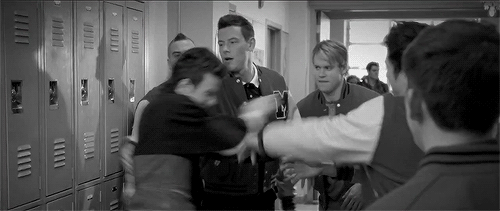Don’t Be a Bully (or Raise One) by Laura Heffernan
This month, some of the other mentors have shared their experience with bullying, how it changed them. I hope these posts have made some people think about this problem, in realizing that our actions really do impact those around us. But if that’s not enough to make people care, to stop bullying (or to encourage their kids to stop), I want to talk about something else: the fact that actions have consequences.

Battery is defined as a harmful or offensive touching. What’s offensive is based on what would be offensive to a reasonable person. Anything that causes bruising or leaves a mark is probably harmful, but offensive can extend to things like spitting in someone’s face (who wouldn’t be offended by that?); brushing against someone “accidentally” and shoving them out of the way or brushing areas they don’t want touched; or “petting” someone’s hair when they don’t want you to. You might think that’s funny or harmless, but it’s actually a misdemeanor. You (or your child) could wind up with a criminal record.
Threatening someone is also a crime in most states. Engaging in a course of conduct that serves no legitimate purpose and is done solely to annoy, harass, or terrorize someone is ALSO criminal – and in many states, it falls within the definition of stalking. Do you really want your twelve-year-old to have a stalking conviction on his record?
Maybe you’re reading this thinking, “Whatever. No one’s going to report me/my kid.” I can’t really speak to that, because my crystal balls in the shop. Or maybe you don’t care if you/your kid has a criminal record. But how would you feel about getting hit in the wallet? Ah, suddenly, that shove against the wall is less funny if it cost you $2,000 – or more. One Chicago family was sued for $50,000 for their child’s bullying. Sure, that’s just Chicago – but most states have laws that hold parents liable for intentional, wrongful acts such as assault, battery, property damage, and intentional infliction of emotional distress.

On top of that, your child can always be sued. A judgment is good for usually 5-10 years, depending on the state, but can be renewed. In some states, it can be renewed forever. A judgment can be a black mark on your child’s credit before they’re even old enough to know what credit is. Entire job markets (like finance) could be unavailable to your child as a result of a civil judgment before they even finish high school. And as a practical matter, a lot of parents wind up paying these judgments, anyway, to help their kid out.
There are real-world consequences for these things. Don’t be a bully. Teach your kids to be kind to others. And if you or your child is being bullied, you have a right to stand up for yourself by asking the courts to help. The law is on your side.

Laura Heffernan is a reality TV addict and women’s fiction writer represented by Michelle Richter at Fuse Literary. She’s been writing ever since she was five years old, and her writing has substantially improved during that time. Laura also works as a freelance editor and is a lawyer in her other life. She’s pro-Oxford comma, anti-unnecessary-to be-verbs, and swears cookie dough is a key part of the food pyramid.
Laura helps other writers as a PitchWars Mentor, QueryKombat and Nightmare on Query Street host, member of the PitchSlam! team, and freelance editor.
When she used to have spare time, Laura enjoyed travel, baking, board games, and new experiences. She lives in the northeast with her amazing husband and two furry little beasts.
Connect with Laura at www.lauraheffernan.com or on Twitter, @LH_Writes.
To find out more about bullying and to learn the warning signs of bullying, go to http://childsafetyblog.org/.
